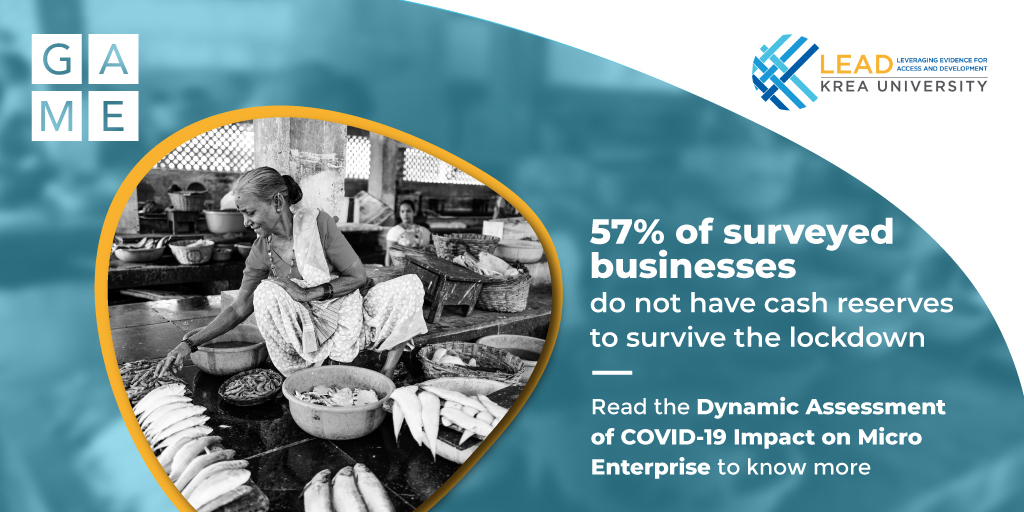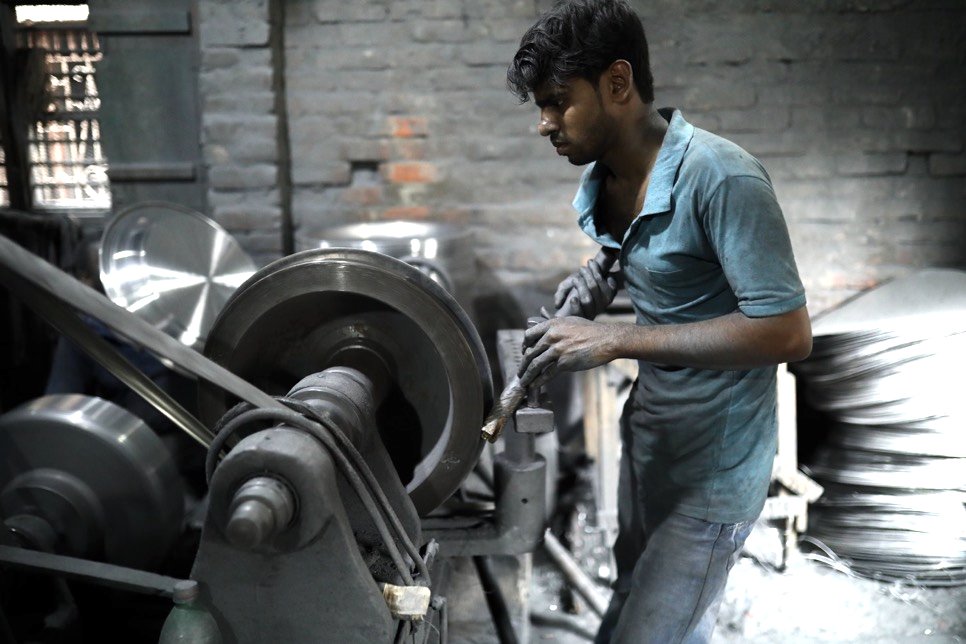Bengaluru, NFAPost: The Global Alliance for Mass Entrepreneurship (GAME), an organisation working to unlock mass entrepreneurship potential, in its latest report states that 81% microbusiness enterprises are confident of a recovery post-Covid19 with a similar number professing that they might need about 4 months for recovery.
The survey with its multidimensional approach interviewed 1300 entrepreneurs of various microbusiness across India over a period of 6 months to assess the impact of Covid-19 on microbusinesses in India which forms the foundation of a significant amount of livelihoods and source of employment.
Through a six-month study undertaken by GAME in collaboration with LEAD at Krea University gives optimism that there are bright spots even though microbusiness enterprises are going through a bad patch in their growth journey.
Micro-business
Commenting on the survey, GAME cofounder Madan Padaki said among the micro-businesses operating (xx %) revenue was just a fraction of pre-lockdown levels.
“Microbusinesses in India forms the foundation of a significant amount of livelihoods and source of employment. Those operating during the lockdown said the revenue was on average 28% of regular revenues under no-lockdown scenarios. 72% said their profits have decreased,” states Madan Padaki.
The GAME initiative comes in the backdrop of the worldwide impact of Covid-19 pandemic on various economies cutting across all dimensions.
The Survey which completed its first phase is based on a quantitative analysis taking into account business factors like Cash Flow, finance and payments; Inventory and Supply Chain; Sales and Business Development and Employment and coping mechanisms. The organisation also states that the survey will also be a qualitative analysis as enterprises rely on a broad ecosystem to function such as financial institutions, government bodies etc .

Consumer spending
The survey states that the impact of the crisis is two-fold, with all nonessential commerce, formal and informal coming to a halt, and second, a large scale reduction in consumer spending will have sustained impact.
In addition, micro-enterprises are particularly vulnerable as they tend to have only a few months of cash flow available, as most are not formally registered or have some form of informality making it challenging to quickly access emergency funds, states the survey.
It is interesting to find that a significant portion of microbusiness participated in the survey do not have a coping strategy in place, while a fraction anticipate they would scale down the business.
“53% of the respondents do not have a coping strategy or plan in place, to deal with a post-Covid-19 business scenario. Among those citing coping strategies, 21% of the respondents said that they would scale down business,” states the survey.
Important findings of survey
● At the initial stage of the lockdown – layoffs were not prominent
o While layoffs remain common across the economy, 79% surveyed businesses said they did not lay off any of their workers. 15%, however, said that they were unable to pay their workers.
● More than half of microbusinesses do not have cash reserves to survive
o 57% reported not having any cash reserves to survive.
● Using their savings to meet expenses
o 65% respondents had to dip into their savings. About Rs 62,270 on average [Median: Rs. 30,000] was wiped out from the savings to meet expenses.
● Significant portion seek out a loan – only a small fraction was from formal sources
o 40% tried to borrow money to cover expenses. Most common sources was from family and friends
o Only 14% of the overall borrowing was from formal borrowing sources.
● Interhousehold conflicts and unaffordable expenses are among key challenges in the household
o 70% of the women entrepreneurs said increased inter-house conflicts is their biggest household challenge. 53% of male entrepreneurs mentioned inter-house conflicts as their major challenge, highlighting that women seem to be bearing more of such conflicts than men.
o 27% of females and 17% of males cited lack of access to essentials as their second biggest challenge
o In terms of household activities during lockdown, 53% of the females suggested housework as their priority task compared with 31% males. On the contrary, none of the women said that they are spending time on ‘Leisure and Entertainment’, while 15% of the men said they spend time on the same.
Potential recommendations to help MSMEs “Survive”
• Enable strong execution of announced packages through state governments and local industry bodies, with clear communication of scheme details to MSMEs and banks; in tandem, mandate 30% of the stimulus package to be released to enterprises falling into the micro and small categories; also, relax NPA classification so that borrowers can repay loans in a longer timeframe and digitise the bank guarantee process
• Set aside funds specifically directed at nearly 1 crore new-to-credit MSMEs with a condition to ‘formalize’ informal businesses
• Enable banks to support existing loans on MSMEs via a credit guarantee fund and ensure easy repayment options for higher recovery
• Increase uptake of supply chain financing and bill invoicing (TReDS) initiatives using member networks of industry bodies (e.g., 50% FICCI, CII members within 12 months)
• Ensure quick disbursement of payables from government excise and tax departments
to MSMEs
Potential recommendations to “Revive” MSMEs:
• Simplify compliances and processes across starting and running a business to ensure effective utilization of entrepreneurs’ time and resources by
- Enabling the implementation of BRAP (Business Reforms Action Plan 2019) in states by creating implementation guidelines, metrics for success and increased ownership of the center on key recommendations
- Rationalising compliances through detailed assessment of associated laws (currently 58K compliances in India across sector, state, etc., leading to significant duplication and enhancing complexity, with 50% of these being labor compliances)
- Simplifying seven key processes with highest impact and likelihood of implementation (registering a new business, registering property, construction permits, filling labor compliances, filling environment health and safety (EHS) compliances, availing credit, and tax compliances and payments)
• Digitize and streamline processes to enable reduction in timelines, decrease parallelization, and ease formalization by creating six key platforms (labor compliance, EHS fillings, tax filings, Information Wizard, central inspection system
and single window)
• Decriminalise nearly 9K compliances with imprisonment which today deter formalisation
• Evaluate ease of doing business at a state level along with objective and measurable criteria, and publish annual scorecard to foster improvement
• Support the sector through private and social partnerships leading to clear governance of industry associations, support network for MSMEs and compliance on payables by:
- Strengthening the industry body network by rationalizing nearly 3.5K industry
bodies and instituting a governance framework to ensure effective collection and
escalation of grievances - Create an MSME support network which includes a pan-India portal and
partnerships with local NGOs, and industry bodies to redirect queries from the
portal to relevant local stakeholders - SEBI/ MCA to mandate clearance of a percentage of invoice value within 45 days
of receipt of invoice and threshold guidelines to be set, e.g., minimum clearance
target of at least 60% of invoice value
This report focuses on recommendations across 4 major buckets:
- Survive: Immediate actions required to ensure liquidity/credit availability to MSMEs
a. Steps to enable strong execution of announced fiscal package
b. Additional fiscal stimuli to provide relief to MSMEs (incl. quantum of credit, mode of
disbursal etc.)
c. Private sector initiatives that can help alleviate stress on MSMEs (TReDs, Supply Chain financing) - Revive: Medium-term (3-6 month) recommendations for increasing ease of doing
business (EoDB) and operationalizing through governance framework
a. Simplify compliances and processes across starting and running a business
b. Digitize: Identify digital solutions to build, to streamline processes
c. Decriminalize: Plan for reduction in criminalization of compliances
d. Evaluate: EoDB for MSMEs across states with scorecard to improve accountability
e. Support: Clear governance of industry associations, designing support infrastructure for MSME network, private sector compliance on payables and initiating a social charter - Thrive: Fundamental changes to create an entrepreneur ecosystem with suitable Seed, Soil, Climate for growth
a. Seed: Education and Incubation to ensure a strong pipeline of future entrepreneurs with the right capabilities
b. Soil: Sector specific initiatives across below levers – with examples for food processing and automotive components
i. Physical and digital infrastructure
ii. Supply and demand linkages
iii. Access to credit and skilled labor
c. Climate: Enabling a culture of entrepreneurship with initiatives on creating the right values systems and enablers around strengthening contract enforcement, improving land, power and labor availability etc. - Sustain: Creating a mission-focussed and accountable organisation under strong leadership to establish the right organization, governance, KPIs and mindset to action above initiatives
The Global Alliance for Mass Entrepreneurship (ME) founded by Ravi Venkatesan, Madan Padaki and Mekin Maheshwari, was officially launched in August 2018, to unlock ME’s potential and as a convening body that brings alignment within the ecosystem and mobilises action to address systemic challenges.





